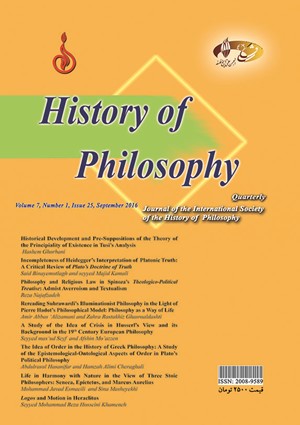Philosophy and Religious law in Spinoza’s Theologico-Political Treatise: Admist Averroism and Textualism
Subject Areas : Geneology of philosophical schools and Ideas
1 - Assistant Professor, Department of Political Science, Shahid Beheshti University
Abstract :
Given the Multi-cultural nature of the development of philosophical systems, it can be claimed that Baruch Benedict de Spinoza formulated his view of the problem of the possibility or impossibility of concurrence of philosophy and religion in line with the tradition of Latin and Jewish Averroists. A major part of his Theologico-Political Treatise is devoted to responding to this problem. Spinoza’s philosophical thoughts were influenced by several philosophical and political traditions. Inspired by the naturalist philosophers of the Renaissance period, he advocated the radical republican tradition and played a significant role in developing the radical Enlightenment heritage. In unity with such trends and while being influenced by the Protestant religious reforms tradition and having a Jewish educational background, Spinoza was continually occupied with the important problem of the possibility or impossibility of reconciling theology and philosophy or religion and rationality. This radical philosopher of the Enlightenment Period encountered holy texts in the light of the Islamic and Jewish legacies of rational thoughts. In order to provide an answer to this problem, he openly dealt with the rationalist and textualist trends of Judaism. Given the huge contribution of Islamic rational thoughts to the rise of the Middle Age Jewish philosophy, his thoughts also dragged him to the domain of Islamic rational philosophy. In comparison to Muslim and Jewish textualists and rationalists of the Middle Ages, he chose the middle way and defended the reasons for his choice in the theological parts of his Theologico- Political Treatise: he argued that neither is philosophy at the service of religion, nor is religion at the service of philosophy. Based on this Spinozist idea, two hypotheses can be postulated: 1) the impossibility of the unity of philosophy and religion in Theologico-Political Treatise does not necessarily indicate providing some secular principles for the public domain; 2) following the historical hermeneutic approach to holy texts, this treatise provides a fideist theory which frees the vast field of living in the modern world from meaningless sterility and coldness.
ابراهيمي ديناني، غلامحسين، فيلسوفان يهودي و يک مسئلة بزرگ، چاپ سوم، انتشارات هرمس، 1390. #
ابراهيمي ديناني، غلامحسين، ماجراي فکر فلسفي در جهان اسلام، انتشارات طرح نو، ج1 و 2، چ2، 1379. #
ابنرشد، ابوالوليد محمد، فصل المقال في ما بين الحکمة و الشريعة من الاتصال، ترجمة سيدجعفر جمشيدي، چ1، انتشارات اميركبير، 1376. #
ابنرشد، ابوالوليد محمد، فصل المقال في ما بين الحکمة و الشريعة من الاتصال، قدمه محمد عابد الجابري، بيروت، مرکز دراسات وحدة العربية، 1997. #
ابنرشد، ابوالوليد محمد، الکشف عن مناهج الادلة في عقايد الملة، قدمه محمد عابد الجابري، بيروت، مرکز دراسات الوحدة العربية، 1998. #
ابنميمون القرطبي الاندلسي، موسي، دلالة الحائرين، عارضه باصول العربية و العبرية و ترجم النصوص دکتور حسين آتاي، مکتبة الثقافة الدينية، 2007. #
اپستاين، ايزيدور، يهوديت: بررسي تاريخي، ترجمة بهزاد سالکي، انتشارات موسسة پژوهشي حکمت و فلسفه ايران، 1388. #
کوهن شرباک، دن، فلسفة يهودي در قرون وسطا، ترجمة علي¬رضا نقدعلي، چ1، قم، مرکز مطالعات و تحقيقات اديان و مذاهب، 1383. #
ليمن، اليور، سنت فلسفي يهودي در جهان اسلام، ترجمة مهدي وهابي و مرتضي کربلايي¬لو، انتشارات آستانه، 1385. #
Maimonides, Moses, The Guide for the Perplexed, translated from the original Arabic text by M. Friedlander, second edition revised, Varda Books, Skokie, Illinois, USA, 2002. #
Decter, Jonathan P., “Ibrahim Ibn al-Fakhar al-Yahudi: An Arabic Poet and Diplomat between Castile and the Maghreb”, Beyond Religious Borders: Interaction and Intellectual Exchange in the Medieval Islamic World, ed. Goldstein, Miriam and David Freidenreich, Philadelphia: University of Pennsylvania Press, 2011. #
Alfakher, Rabbi Yehuda, Iggeret Kena’ot Kovetz Teshuvot HaRambam, Leipzig, 1859 2a, translation Central Problems of Medieval Jewish, 1859. #
Hegel, G. W. F., Lectures on the History of Philosophy, vol. III, translated from the German by E. S. Haldane and Frances H. Simson, London, Routledge and Kegan Paul, 1896. #
Spinoza, Benedictus de, Spinoza: Complete Works, with translations by Samuel Shirley, edited with Introduction and Notes by Michael L. Morgan, Indianapolis and Cambridge: Hackett Publishing Company, 2002. #
Spinoza, Benedictus de., “A Theologico-Political Treatise”, in The Chief Works of Benedict de Spinoza, trans. by Elwes, vol. 1, The Pennsylvania State University, 2002. #
Spinoza, Benedictus de., Theological-Political Treatise, edited by Jonathan Israel, translated by Michael Silverthorne and Jonathan Israel, Princeton, New Jersey, 2007. #
Strauss, Leo, Spinoza’s Critique of Religion, New York, Schocken Books, reprinted by University of Chicago Press, 1996. #
Strauss, Leo and Joseph Cropsey (eds.), History of Political Philosophy, third edition, The University of Chicago Press, 1987. #
Strauss, Leo and Joseph Cropsey, Persecution and the Art of Writing, Chicago, University of Chicago Press, 1988. #
Strauss, Leo and Joseph Cropsey, “How to Study Spinoza’s Tractus Theologico-Politicus”, in Persecution and the Art of Writing, Chicago, University of Chicago Press; reprinted in Strauss, Jewish Philosophy and the Crisis of Modernity, ed. Kenneth Hart Green, Albany, N.Y., SUNY Press, 1997, 1988. #
Wolfson, Harry Austryn, The Philosophy of Spinoza: Unfolding the Latent Processes of His Reasoning, Cambridge, Massachusetts, Harvard University Press, 1934. #
Cohn-Sherbok, Dan, Fifty Key Jewish Thinkers, Routledge, 1997. #
Manekin, Charles, Medieval Jewish Philosophical Writing, Cambridge texts in the history of philosophy, Cambridge University Press, 2007. #


